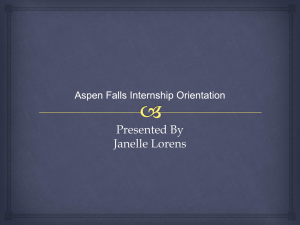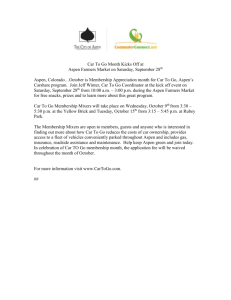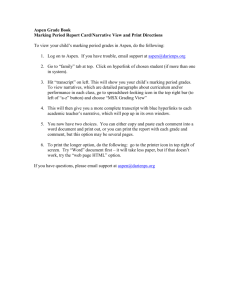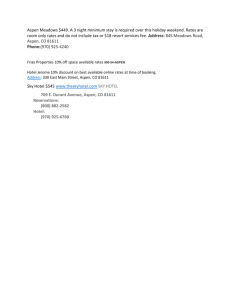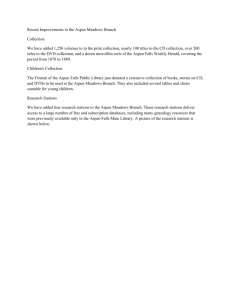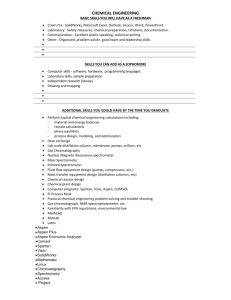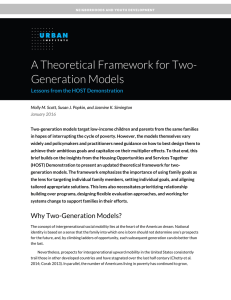Why a two-generation approach?
advertisement
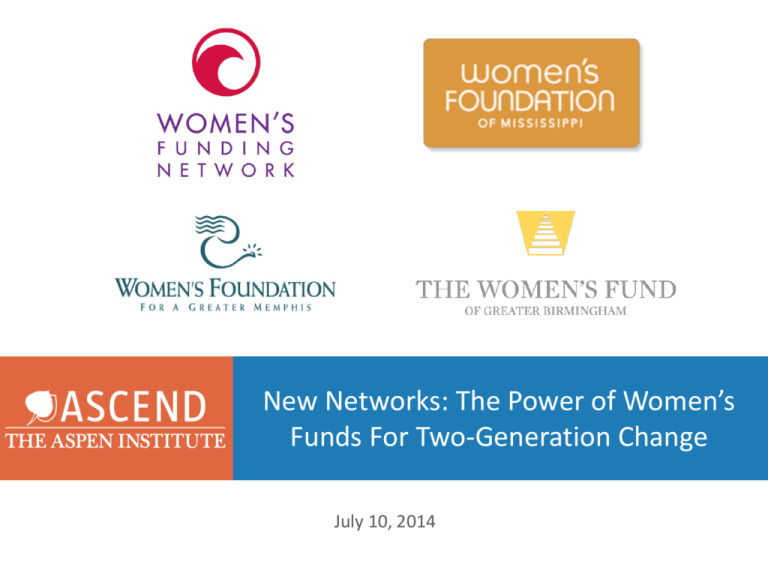
New Networks: The Power of Women’s Funds For Two-Generation Change July 10, 2014 A shared vision for women’s philanthropy Ascend at the Aspen Institute • April 2014 Why a two-generation approach? In the U.S. today, nearly 45 percent of children live in lowincome families. The long-term economic prosperity of our country is at risk when children, parents, and families, resilient in spite of great odds, struggle to achieve educational and economic success. Ascend at the Aspen Institute • April 2014 Two-generation core components early childhood education social capital networks, friends, and neighbors health & well-being mental health addressing adverse childhood experiences Ascend at the Aspen Institute • June 2014 postsecondary & employment pathways economic supports asset building housing 4 Why is education at the core? Return on investment in education for children AND their parents is high Ascend at the Aspen Institute • June 2014 5 How do relationships fit into two-gen? social capital • Career coaches, cohort models, and case managers • Family, friends, and neighbors • Community and faith-based organizations • School and workplace contacts • Leadership and empowerment programs • Family engagement Ascend at the Aspen Institute • June 2014 6 Healthy children = Healthy adults Childhood Trauma has Long-Term Effects Death early death Whole Life Perspective disease, disability, & social problems adoption of health-risk behaviors social, emotional, & cognitive impairment adverse childhood experiences Conception Randa, R. F. & Felitti, V. J. The Adverse Child Experiences Study. Retrieved from http://acestudy.org Ascend at the Aspen Institute • June 2014 7 What supports help stabilize families? economic supports • Housing • Transportation • Financial education and asset building • Tax credits • Student financial aid • Food assistance Ascend at the Aspen Institute • June 2014 8 Who we are: Women’s Funding Network The largest philanthropic network in the world dedicated to improving the lives of women and girls Through more than 165 women’s funds and foundations in over 30 countries, we support and champion a vision that a better world for women and girls is a better world for all. WFN & Two Generation Approach Partnership for Women’s Prosperity • Six women’s funds and foundations, with Women’s Funding Network connecting them and sharing knowledge and practices for replication across our Network • Creating sustainable change in a multifaceted way: – How do we dismantle poverty? – What do good jobs look like for women? – How do we support individual women, while recognizing the systemic barriers affecting their path to economic security? • New strategies, a learning community, and $2.6 million in grantmaking combined to reach 13,000 women COLLABORATION INSTITUTE How it Works: We Connect the Dots The Women’s Fund of Greater Birmingham provides the time and resources for agencies to collaborate and create solutions that never before existed. Teams Formed Plans Formalized Careful Review Funding Awarded Organizations from a variety of sectors begin working together. Teams receive targeted consulting from experts. Each proposal is thoroughly researched to ensure quantifiable success. Selected teams move women out of poverty. A TWO-GENERATION MODEL Pharmacy Technician Training Program (Pell City, Alabama) Jefferson State Community College Post-Secondary Skills Training Alabama Career Center Social Capital (Career Coaching) Higher Wage Jobs for Women Head Start Childcare and Early Education Pell City United Methodist Economic Supports (Food Assistance) Mississippi has: •A health problem •An education problem •An economic problem Two generation programs are the common sense answer to all three. Women’s Foundation for a Greater Memphis Memphis Two–Generation Solutions • • Urban Strategies Memphis HOPE® Access to Early Childhood Education and Development by Engaging Parents as Ambassadors and Advocates Supporting Education and Workforce Training for Women and Youth Development through Public Private Partnerships • Yolonda Solutions in Action: The McGee Family’s Trajectory To Success Literacy Council Adult GED Program Bridges Out of Poverty Martavious, Robin, Robert, Michelle Intentional Integration through Parent Involvement and Family Supports Leadership Academy Technology and Employment Assets for Independence Family Success RISE financial literacy Women’s Foundation for a Greater Memphis Early Childhood Education Innovation Pilot Program (ECEIP) ECEIP Ambassadors Program Ambassador Leaders Recruitment Orientation Training Mentoring and Home Visits Ambassador Partners Parent Interview Pre-Assessment Nurse-Family Partnership @ Le Bonheur Early Success Coalition Network Urban Child Institute Research Women’s Foundation for a Greater Memphis Women and Families Economic Security Opportunities Blueprint for Prosperity Innovation Zone Parent Ambassadors Goals • • Expanding public-private partnerships with businesses Eliminate poverty by 5% over 5 years in Shelby County’s poorest zip code, 38126 Train parent Ambassadors to advocate for Early Childhood Education among other parents in their community Expand Memphis HOPE’s two-generation approach to providing wraparound social services to include 3 years of annual evaluation measuring program effectiveness and collective partnership impact outcomes. Establish a public-private Innovation and Collaboration Training Institute designed to build a systemic and collective approach to address issues and barriers to improve women’s economic security. Women’s Funds as Laboratories for National Change In Minnesota, a landmark “Women’s Economic Security Act” was passed in May 2014. The Act was spearheaded by the Women’s Fund of Minnesota, led by Lee Roper-Batker. WFM acted as a bipartisan advocate and messenger in moving the legislation through the state legislature. Ascend at the Aspen Institute • June 2014 19 Creating tools with, and for, the field http://ascend.aspeninstitute.org @AspenAscend Facebook/AspenAscend Ascend at the Aspen Institute • June 2014 20
